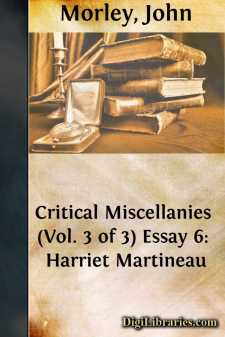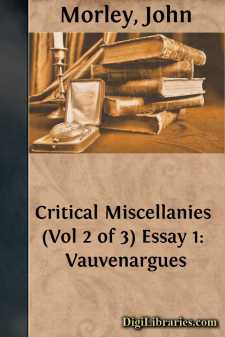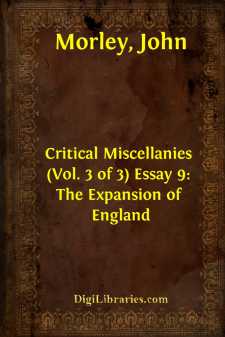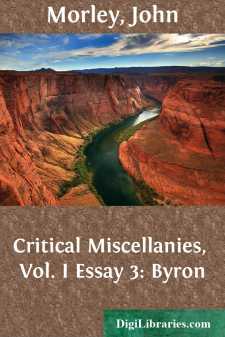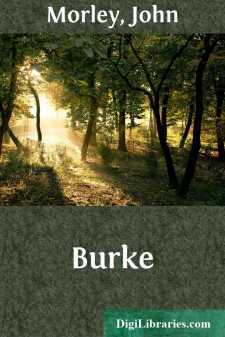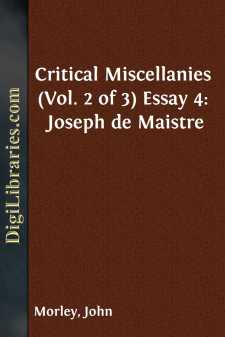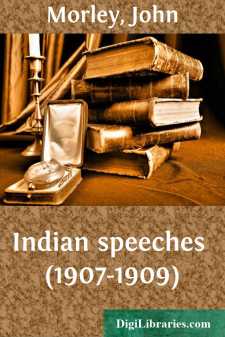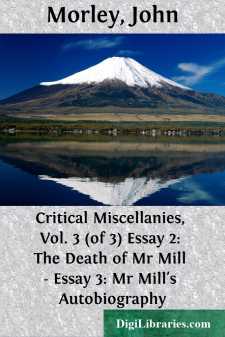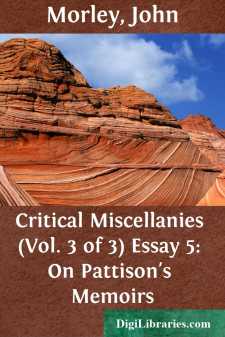Categories
- Antiques & Collectibles 13
- Architecture 36
- Art 48
- Bibles 22
- Biography & Autobiography 813
- Body, Mind & Spirit 142
- Business & Economics 28
- Children's Books 17
- Children's Fiction 14
- Computers 4
- Cooking 94
- Crafts & Hobbies 4
- Drama 346
- Education 46
- Family & Relationships 57
- Fiction 11829
- Games 19
- Gardening 17
- Health & Fitness 34
- History 1377
- House & Home 1
- Humor 147
- Juvenile Fiction 1873
- Juvenile Nonfiction 202
- Language Arts & Disciplines 88
- Law 16
- Literary Collections 686
- Literary Criticism 179
- Mathematics 13
- Medical 41
- Music 40
- Nature 179
- Non-Classifiable 1768
- Performing Arts 7
- Periodicals 1453
- Philosophy 64
- Photography 2
- Poetry 896
- Political Science 203
- Psychology 42
- Reference 154
- Religion 513
- Science 126
- Self-Help 84
- Social Science 81
- Sports & Recreation 34
- Study Aids 3
- Technology & Engineering 59
- Transportation 23
- Travel 463
- True Crime 29
John Morley
John Morley (1838-1923) was a British Liberal statesman, writer, and editor renowned for his contributions to politics and literature. He served as the Chief Secretary for Ireland and Secretary of State for India, advocating for Home Rule and liberal reforms. Morley is also remembered for his biographical works on influential figures like Edmund Burke and Voltaire, reflecting his deep engagement with historical and philosophical subjects.
Author's Books:
Sort by:
by:
John Morley
HARRIET MARTINEAU. In 1850 Charlotte Brontë paid a visit to Harriet Martineau at Ambleside, and she wrote to her friends various emphatic accounts of her hostess. 'Without adopting her theories,' Miss Brontë said, 'I yet find a worth and greatness in herself, and a consistency, benevolence, perseverance in her practice, such as wins the sincerest esteem and affection. She is not a...
more...
by:
John Morley
VAUVENARGUES. One of the most important phases of French thought in the great century of its illumination is only thoroughly intelligible, on condition that in studying it we keep constantly in mind the eloquence, force, and genius of Pascal. He was the greatest and most influential representative of that way of viewing human nature and its circumstances, which it was one of the characteristic glories...
more...
by:
John Morley
THE EXPANSION OF ENGLAND. 'There is a vulgar view of politics which sinks them into a mere struggle of interests and parties, and there is a foppish kind of history which aims only at literary display, which produces delightful books hovering between poetry and prose. These perversions, according to me, come from an unnatural divorce between two subjects which belong to one another. Politics are...
more...
by:
John Morley
BYRON. It is one of the singular facts in the history of literature, that the most rootedly conservative country in Europe should have produced the poet of the Revolution. Nowhere is the antipathy to principles and ideas so profound, nor the addiction to moderate compromise so inveterate, nor the reluctance to advance away from the past so unconquerable, as in England; and nowhere in England is there...
more...
by:
John Morley
CHAPTER I EARLY LIFE, AND FIRST WRITINGS It will soon be a hundred and twenty years since Burke first took his seat, in the House of Commons, and it is eighty-five years since his voice ceased to be heard there. Since his death, as during his life, opinion as to the place to which he is entitled among the eminent men of his country has touched every extreme. Tories have extolled him as the saviour of...
more...
by:
John Morley
JOSEPH DE MAISTRE. Owing to causes which lie tolerably near the surface, the remarkable Catholic reaction which took place in France at the beginning of the present century, has never received in England the attention that it deserves; not only for its striking interest as an episode in the history of European thought, but also for its peculiarly forcible and complete presentation of those ideas with...
more...
by:
John Morley
I ON PRESENTING THE INDIAN BUDGET (HOUSE OF COMMONS. JUNE 6, 1907) I am afraid I shall have to ask the House for rather a large draft upon its indulgence. The Indian Secretary is like the aloe, that blooms once in 100 years: he only troubles the House with speeches of his own once in twelve months. There are several topics which the House will expect me to say something about, and of these are two or...
more...
by:
John Morley
THE DEATH OF MR. MILL. (May 1873.) The tragic commonplaces of the grave sound a fuller note as we mourn for one of the greater among the servants of humanity. A strong and pure light is gone out, the radiance of a clear vision and a beneficent purpose. One of those high and most worthy spirits who arise from time to time to stir their generation with new mental impulses in the deeper things, has...
more...
by:
John Morley
CHAPTER I.OTHER DIALOGUES. We may now pass to performances that are nearer to the accepted surface of things. A short but charming example of Diderot’s taste for putting questions of morals in an interesting way, is found in the Conversation of a Father with his Children (published in 1773). This little dialogue is perfect in the simple realism of its form. Its subject is the peril of setting one’s...
more...
by:
John Morley
ON PATTISON'S MEMOIRS. To reckon the subject of this volume among leading minds who have stamped a deep influence on our generation, is not possible even to the friendliest partiality. That was not his position, and nobody could be less likely than he would himself have been to claim it. Pattison started no new problem. His name is associated with no fertile speculation, and with no work of the...
more...


